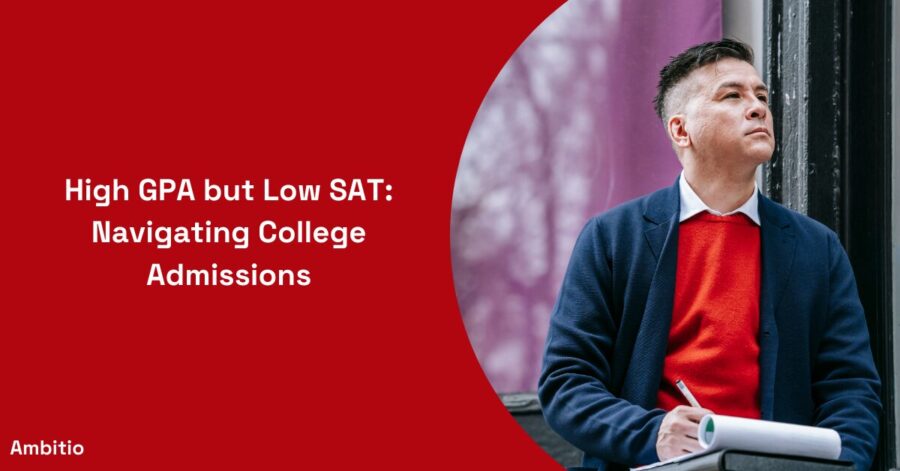14 December 2024
5 minutes read
High GPA but Low SAT: Navigating College Admissions

Applying for college admissions with a high GPA but low SAT score can be stressful and confusing. Many students face this dilemma and wonder how admissions officers will perceive their application.
While a low SAT score is a concern, it is important to remember that college admissions consider various aspects of your application, including your high school GPA, extracurricular activities, and AP or IB courses.
Understanding the SAT Score Percentile
Understanding where your SAT score stands in comparison to other test-takers is crucial for assessing your chances of getting accepted into your dream school. The SAT score percentile represents the percentage of students whose scores are lower than yours.
For example, if you scored in the 75th percentile, it means that your score is higher than 75% of the students who took the test.
A score of 1300 is at the 75th percentile, meaning you scored higher than 75% of test-takers, while a 1450 is at the 90th percentile. Knowing your percentile can help you gauge your standing among college applicants and determine if you should retake the test to improve your percentile rank.
Strategies to Make Up for a Low SAT Score
If your SAT score is low, it is advisable to consider retaking the test. Preparing thoroughly for the retake, possibly with the help of an SAT prep course, can lead to a significant improvement in your score. However, if retaking the SAT is not an option, there are other ways to enhance your college application.
- Strong Personal Statement:
- Use your personal statement to showcase your personality, passion, and reasons behind academic choices.
- A well-crafted personal statement helps admissions officers understand your strengths and potential contribution.
- Extracurricular Activities:
- Participation in extracurriculars reflects a well-rounded profile with interests beyond academics.
- Involvement in clubs, sports, or volunteer work highlights your skills and dedication.
- AP or IB Courses:
- Enrolling in challenging courses like AP or IB demonstrates academic ambition and capability for rigorous work.
- Enrolling in challenging courses like AP or IB demonstrates academic ambition and capability for rigorous work.
- Letters of Recommendation:
- Strong, personalized letters from teachers or mentors provide insights into your character and strengths.
- Recommendations play a significant role in enhancing your application’s impact.
The Importance of the Rest of Your Application
While SAT scores are an important part of your college application, they are just one piece of the puzzle. Many colleges and universities consider the whole application, including your high school GPA, extracurricular activities, letters of recommendation, and personal statement.
High school GPA is often considered more important than SAT scores because it reflects your academic performance over four years of high school. A high GPA indicates that you have consistently performed well in your classes and can handle college-level work.
- Extracurricular activities show colleges that you have interests and passions outside of the classroom and can contribute to the campus community in meaningful ways.
- Letters of recommendation provide insight into your character and work ethic from people who know you well.
- Your personal statement is an opportunity to express yourself and explain any extenuating circumstances that may have affected your academic performance or test scores.
Therefore, while a low SAT score may be disappointing, it is essential to focus on strengthening the other parts of your application to increase your chances of getting accepted.
Dealing with Test Anxiety
Test anxiety is a common issue that many students face, and it can significantly impact your SAT score. If you believe that test anxiety contributed to your low SAT score, it is important to address this issue before retaking the test.
- Practice Mindfulness and Relaxation Techniques:
- Utilize techniques like deep breathing or meditation to ease anxiety and enhance concentration.
- Utilize techniques like deep breathing or meditation to ease anxiety and enhance concentration.
- Take Practice Tests:
- Simulate test conditions by taking practice tests with time constraints.
- Familiarity with the format reduces anxiety during the actual test.
- Seek Support:
- If test anxiety is detrimental, seek guidance from counselors or mental health professionals.
- Their support can aid in managing anxiety’s impact on performance.
Consider Test-Optional Colleges
Due to the COVID-19 pandemic, many colleges and universities have adopted test-optional admissions policies, meaning they do not require SAT or ACT scores for admission. If you have a strong application in other areas, such as a high GPA, extracurricular activities, and a compelling personal statement, you may want to consider applying to test-optional colleges.
- Research Test-Optional Colleges:
- Create a list of test-optional colleges aligning with your desired program.
- Thoroughly explore admission requirements for each college on your list.
- Evaluate Your Application:
- Analyze your application strengths like GPA, extracurriculars, and personal statement.
- Decide if these strengths can overshadow a lower SAT score.
- Consider the Pros and Cons:
- While test-optional colleges enhance acceptance odds, weigh other college factors.
- Reflect on location, size, and cultural aspects of colleges in your decision-making.
The Decision to Retake the SAT
Deciding whether to retake the SAT is a crucial decision that can impact your college admissions prospects. Here are some factors to consider when making this decision:
- Potential for Improvement:
- Assess if there’s a chance for substantial score enhancement.
- If you can notably improve with more preparation, consider retaking the test.
- Time and Resources:
- Reflect on the availability of time and resources for retake preparation.
- Options like SAT prep courses, tutoring, or self-study should be weighed.
- Impact on Your Application:
- Contemplate the effect of an improved score on your application.
- If a higher SAT score significantly boosts your application, retaking might be valuable.
Final Thoughts
Applying for college admissions with a high GPA but low SAT score can be challenging, but it is essential to remember that your SAT score is just one part of your application.
Focus on strengthening the other parts of your application, consider retaking the SAT, and explore test-optional colleges to increase your chances of getting accepted.
Ultimately, a well-rounded application that showcases your strengths and passions will give you the best chance of success in the college admissions process.
FAQ
Can I still get into a good college with a high GPA but a low SAT score?
Yes, many colleges consider other aspects of your application, such as your extracurricular activities, personal statement, and AP or IB courses. A strong application in these areas can help offset a low SAT score.
Should I retake the SAT if I have a low score but a high GPA?
It is advisable to consider retaking the SAT if you believe you can significantly improve your score with additional preparation. However, also consider other aspects of your application and the admissions requirements of the colleges you are applying to.
How can I strengthen my college application if I have a low SAT score?
Focus on enhancing other aspects of your application, such as your personal statement, involvement in extracurricular activities, and taking challenging courses like AP or IB. Strong letters of recommendation and explaining any extenuating circumstances can also help strengthen your application.
Do all colleges require SAT scores for admission?
No, many colleges and universities have adopted test-optional admissions policies, meaning they do not require SAT or ACT scores for admission. However, it is always advisable to check the admission requirements of the colleges you are applying to.
How can I deal with test anxiety before retaking the SAT?
Practicing mindfulness and relaxation techniques, taking practice tests under timed conditions, and seeking support from a counselor or mental health professional can help reduce test anxiety.
Is it worth applying to test-optional colleges if I have a low SAT score?
Applying to test-optional colleges may increase your chances of getting accepted if you have a strong application in other areas, such as a high GPA, extracurricular activities, and a compelling personal statement. However, it is also important to consider other factors, such as the location, size, and culture of the college.

You can study at top universities worldwide!
Get expert tips and tricks to get into top universities with a free expert session.
Book Your Free 30-Minute Session Now! Book a call now




























